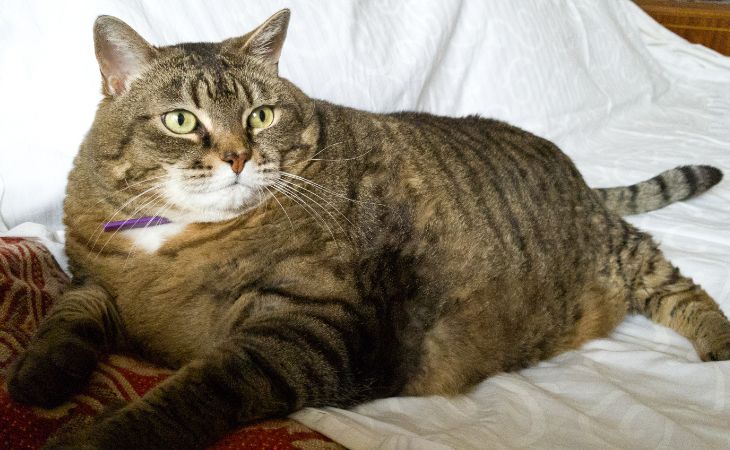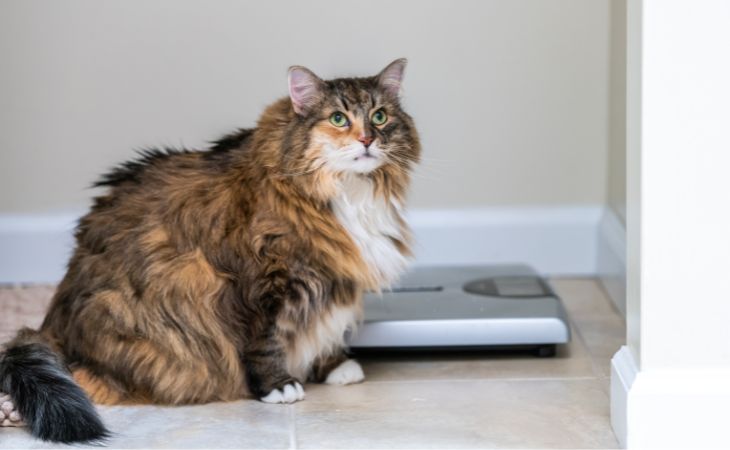Obesity in cats is a common health issue that can have harmful affects on their well-being. But how do you help your cat lose weight? In this article, Letsgetpet will provide you helpful tips and advice to help your obese cat.
How do I know if my cat is obese?
Visual observation is often a good initial indicator. An obese cat has a generally round appearance and their waist is barely visible. Instead of a slender and proportionate silhouette, they can appear massive. An obese cat can also have a preponderant stomach. In addition, when you pass your hand on their flank, you would normally feel the ribs with a small layer of fat. If it’s difficult to feel this or it is completely masked by a thick layer of fat, this can indicate obesity.
You can also observe the behavior of your feline friend to see if they are obese. For example, overweight cats often have less energy and motivation for physical activity. They can be less interested playing, have issues moving around with agility, or have a tendency to get tired quicker. Signs of lethargy and inactivity can also be indicators of excess weight.
Weighing your cat is a precise way to determine if your cat is obese. Most vets have special scales for pets. Compare the actual weight of your cat with the appropriate mass reference for their breed, according to their age and size.
Cats are considered obese when their weight exceeds at least 30% of their ideal weight. For example, the normal mass of a Maine Coon cat is 3.6 to 8.2 kg (≈ 7.9 to 18.1 lb) and between 6 and 11 kg (≈ 13.2 to 24.3 lb) for a Norwegian Forest Cat. Your vet can provide you with precise information regarding your cat’s ideal weight.
What are the factors that contribute to obesity in cats?
Overeating is one of the main causes of obesity in a cat. When you give too much food, large proportions, or frequent treats, this can lead to weight gain. Some owners can overfeed their cats because of a misunderstanding of the nutritional needs of their cat or because of giving affection.
In addition, a very sedentary lifestyle and a lack of physical activity can lead to an accumulation of fat in cats. These animals are naturally active and need to play, run, and jump to stay healthy. If they do not have enough opportunity for exercise, they can become inactive and gain weight.
Some breeds also have a genetic predisposition to obesity. For example, breeds such as the Maine Coon, British Shorthair, and Ragdoll have a tendency to gain weight more easily. Behavior issues, notably bulimia and anxiety, can cause obesity in a cat.
Also, neutered cats have a slower metabolism. This means they burn less calories, which can raise the risks of obesity if they do not receive a balanced diet and do not get enough exercise. Neutered cats also have a tendency to feel more hungry. This can lead to overeating.

What are the consequences of obesity on a cat’s health?
Obese cats are more prone to develop metabolic diseases, notably diabetes or thyroid issues. Excess weight can disturb the normal metabolism and lead to a resistance to insulin and hormonal fluctuations. This can lead to the development of diabetes, a chronic disease that needs attentive care and management.
In addition, obesity raises the risks of developing cardiovascular diseases. The excess fat can exert additional pressure on the cardiovascular system. This raises the risks of complications such as cardiac diseases and strokes. These cardiovascular issues can worsen the quality of life of your cat and reduce the lifespan of your cat.
Obesity can also lead to urinary infections and kidney failure. If your cat is suffering from something like this, their preponderant stomach can prevent them from grooming themselves well, especially around intimate areas, and this can create skin issues and infections.
The surplus of weight also puts additional pressure on your cat’s joints. This can lead to arthritis issues. Overworked articulations are also more susceptible to be overused prematurely, which leads to pain and the need for more assistance. Obese cats have also have a hard time getting around and jumping. This limits their daily activity and their quality of life.
Obesity in animals is associated with a reduce in the lifespan. If you notice that your cat is obese, they will be more prone to develop chronic diseases and health complications can shorten their lifespan.
My cat is obese, how do I help them lose weight?
If your cat is obese, you need to help them lose weight in a safe and efficient manner. You need to start by consulting a vet. A review from a specialist will allow you to recognize the causes of their weight gain and find the appropriate solutions. Based on their health condition, the vet will elaborate a plan to manage their weight. This can include specific recommendations regarding their food, exercise, and follow-ups.
Follow the directives of your vet when it comes to your cat’s diet. It might be necessary to change to a special diet for weight loss, with controlled portions and reduce in calories. You should also avoid giving treats.
To change your cat’s food, you need to do it progressively in order to avoid food troubles. For example, you can give a daily portion of 20% of the new food for a few days. After a week, you can considerably raise the quantity in their food. Also, make sure that your cat drinks enough water to stay hydrated.
In addition, you need to be certain that the food your cat eats is balanced and responds to their nutritional needs. In fact, an unbalanced food diet can cause nutritional deficiencies, even during weight loss.
Also, play regularly with your cat to encourage them to be active. There are many toys you can play with your cat, such as a cat fishing pole toy, a ball, a game of hide-and-seek. Use interactive toys and encourage them to run. Raise the intensity of the exercises little by little to avoid hurting them or shocking their cardiovascular system.
Regularly weight your cat to follow their progression. Do not expect rapid weight loss because this can be dangerous for their health. It is preferable that it is slow and progressive.
Weight loss can take time. Therefore, be patient and persevere. If you notice any difficulties, consult your vet again to adjust their weight loss plan. This specialist has the knowledge and skills necessary to better guide you in your cat’s treatment.

